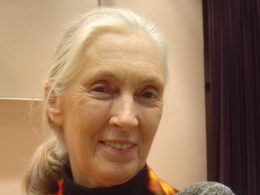
Introduction
Jane Goodall is renowned as one of the world’s foremost primatologists, whose groundbreaking research and lifelong dedication to animal welfare and environmental conservation have shifted public perceptions and scientific understanding of primate behavior. Her contribution is more significant than just academia; it bridges essential aspects of ecology, conservation, and ethics, making her work increasingly relevant as global ecological challenges escalate.
Trailblazing Research
Goodall first arrived in Gombe Stream National Park, Tanzania, in 1960 to study wild chimpanzees. Her findings revolutionized the field of primatology. She observed behaviors that were previously thought to be unique to humans, such as tool-making and complex social structures. Goodall’s meticulous documentation provided insight into the intelligence and emotional richness of these primates, altering the scientific narrative surrounding them.
Advocacy and Conservation Efforts
Beyond her research, Goodall is fiercely committed to conservation. In 1977, she founded the Jane Goodall Institute, aiming to advance the understanding and protection of chimpanzees and their habitats. Her work emphasizes the importance of preserving ecosystems, notably advocating against deforestation and habitat destruction. The institute also engages local communities in conservation efforts through education and sustainable practices.
In recent years, Goodall has expanded her efforts to include a broader ecological framework. Her Roots & Shoots program empowers young people around the world to take action in their communities, advocating for animal welfare, environmental justice, and social change. As climate change and biodiversity loss become pressing global issues, Goodall’s initiatives resonate with a new generation of activists.
Recognition and Influence
Jane Goodall’s impact has garnered widespread recognition. She has received numerous awards, including the Goldman Prize and the UN Messenger of Peace designation. Goodall’s compelling stories and passion for wildlife preservation have inspired countless individuals and leaders globally, demonstrating that one person can indeed make a difference.
Conclusion
As Jane Goodall continues her advocacy at age 89, her voice remains a powerful tool for change. She actively travels the world, speaking on the interconnectedness of humans and nature. Her dedication reinforces the idea that protecting primates and their habitats is crucial not only for ecological health but also for our collective future. With wildlife conservation becoming more vital, Goodall’s life work encourages responsibility and action, urging us all to become stewards of the earth.



